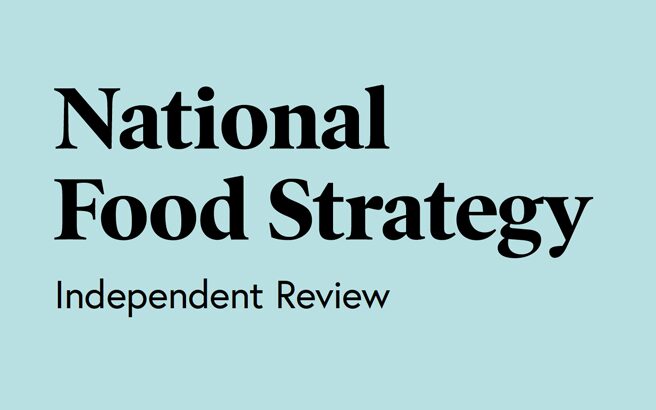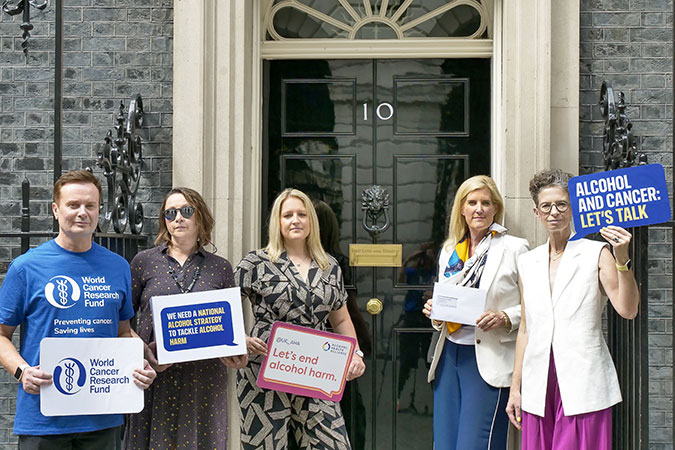Nutrition policy in the COVID-19 era: a spotlight on the UK

This month Ioana Vlad looks at the first anniversary of the UK’s latest obesity strategy which was launched at the height of the COVID-19 pandemic, assesses progress and looks at other opportunities for public policy catalysed by the pandemic.
The COVID-19 pandemic has forced many governments across the world to re-evaluate their health policy priorities and approaches. The UK has been an interesting example of COVID-19 prompting greater policy action in public health, especially with regards to risk factors of underlying health conditions that led to worse outcomes when suffering from COVID-19, such as obesity – which is also a leading risk factor for cancer. This has captured the attention of public health advocates from around the world.
On 27 July 2020, the UK Department of Health and Social Care launched the Tackling Obesity strategy which highlighted obesity as one of the ‘greatest long-term health challenges’ England faces. Its one-year anniversary in July 2021 also coincided with the launch of the National Food Strategy for England.
The two documents are different in nature, as the former is a government plan, whereas the latter is an independent report to government, to which a response by the government is expected in the next six months. Still, taken together, they introduce innovative, first-of-their kind policy ideas such as a total ban on online advertising of unhealthy foods which are high in fat, sugar and salt (HFSS foods).
The National Food Strategy also proposed the world’s first Sugar and Salt Reformulation Tax, which would tax salt and sugar intended to be used in food and drink production to incentivise industry to use less (Check out Sustain’s blog explaining more about the proposed tax).
Why focus on food environments?
Both strategies include policies that aim to make food environments healthier, with the National Food Strategy in particular making this focus its central pillar. Food environments are important because they shape all the conscious and unconscious choices we make every day about our food.
The two strategies have the potential to work well in tandem. For example, the income of the Sugar and Salt Reformulation Tax would be accompanied with an expansion of free school meals and programmes to support healthier diets for those living in the most deprived neighbourhoods. But whether this money would be spent on nutritious foods depends on whether rules for public procurement of healthy, sustainable food and drink are strengthened, as highlighted in both strategies.
Further, the Tackling Obesity strategy announced measures to improve marketing and labelling of infant foods – an area of much needed policy action, whereas the National Food Strategy recommends expanding the Healthy Start voucher scheme that allows pregnant women and families to buy milk as well as plain fresh and frozen fruit and vegetables in local stores. However, policy to support breastfeeding remains underrepresented, a key area that needs support, especially given that, despite breastfeeding being the best form of nutrition for babies for mothers who are able to do so, the UK has one of the lowest breastfeeding rates in the world.
But these policy proposals have been met with lots of opinion pieces about ‘nanny state’ and about how further taxes show ‘disdain for the working poor’, as well as shifting responsibility to individuals – and adding an unhealthy dose of weight stigma in the process. This is a well-known strategy used, sometimes successfully, in countries around the world against similar policy proposals such as sugar–sweetened beverage taxes (read more about these strategies and how to combat them in our Building Momentum report).
The power to influence our food environments lays firmly with the biggest players, such as food manufacturers and governments. What is more, the reality remains that voluntary measures are often ineffective – in the UK, voluntary measures on salt and sugar reduction have not delivered the progress needed on items such as sweets, chocolate, biscuits and cakes.
As seen from the lack of success of voluntary efforts, government regulation is necessary to shift market incentives from the production of unhealthy foods such as red or processed meat or junk foods, to the detriment of our health, our societies and our planet. The National Food Strategy does a good job at explaining the links between the food system and threats to our health and our natural environments such as deforestation, loss of biodiversity and climate change by identifying and naming the two main problems of the food system as the ‘Junk Food Cycle’ and the ‘Invisibility of Nature’.
From promises to action
Notably, the Tackling Obesity strategy marks a shift in approach in the UK. Recent research that looked at all government policies on the topic in the last 30 years found that many of these shied away from a more interventionist approach necessary for structural change. In the past, obesity strategies and plans focused on policies that put the onus of action on individuals rather than target their environments. However, the UK government has slowly started to recognise the need for more interventionist policies to improve public health.
At this time of crisis, we are starting to see a shift to policies that recognise the role of the system in shaping behaviours and diets. This is a welcome change in focus, which hopefully will be followed by action. We wait to see if the UK Government will take forward the recommendations in the National Food Strategy.
This opportunity for change – and chances to address the inequities that make societies vulnerable – is felt by governments across the world, albeit in specific ways in each country. It is important that policymakers learn from one another about ways to tackle the underlying social vulnerabilities brought to light by COVID-19.
In November, as a special session on a pandemic treaty will convene at the World Health Assembly, it is vital that strategies to improve population health, address risk factors and prevent conditions such as obesity, NCDs and cancer form an integral part of the discussions.



